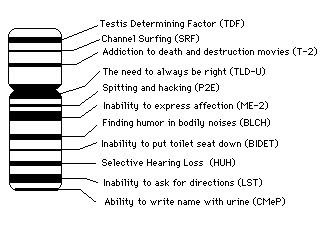Welcome to DU!
The truly grassroots left-of-center political community where regular people, not algorithms, drive the discussions and set the standards.
Join the community:
Create a free account
Support DU (and get rid of ads!):
Become a Star Member
Latest Breaking News
General Discussion
The DU Lounge
All Forums
Issue Forums
Culture Forums
Alliance Forums
Region Forums
Support Forums
Help & Search
Video & Multimedia
Related: About this forumColbert: MIT Professor David Page Extended Interview on the evolution of the Y chromosome
Wasn't enough time on the show last night...
Monday March 26, 2012
In this unedited, extended interview, biomedical researcher Dr. David Page discusses the evolution of the Y chromosome.
http://www.colbertnation.com/the-colbert-report-videos/411143/march-26-2012/exclusive---david-page-extended-interview
In this unedited, extended interview, biomedical researcher Dr. David Page discusses the evolution of the Y chromosome.
http://www.colbertnation.com/the-colbert-report-videos/411143/march-26-2012/exclusive---david-page-extended-interview
InfoView thread info, including edit history
TrashPut this thread in your Trash Can (My DU » Trash Can)
BookmarkAdd this thread to your Bookmarks (My DU » Bookmarks)
5 replies, 4713 views
ShareGet links to this post and/or share on social media
AlertAlert this post for a rule violation
PowersThere are no powers you can use on this post
EditCannot edit other people's posts
ReplyReply to this post
EditCannot edit other people's posts
Rec (2)
ReplyReply to this post
5 replies
 = new reply since forum marked as read
Highlight:
NoneDon't highlight anything
5 newestHighlight 5 most recent replies
= new reply since forum marked as read
Highlight:
NoneDon't highlight anything
5 newestHighlight 5 most recent replies
Colbert: MIT Professor David Page Extended Interview on the evolution of the Y chromosome (Original Post)
pokerfan
Mar 2012
OP
seabeyond
(110,159 posts)1. i am glad men are going to be ok. maybe they can stop obsessing about it now.
that was some X chromosone though, i am tellin ya.
pokerfan
(27,677 posts)2. It's not even the largest human chromosome
but it looks like that was the correct proportion between X and Y:
[center] [/center]
[/center]
The human Y chromosome has lost 1,393 of its 1,438 original genes over the course of its existence. With a rate of genetic loss of 4.6 genes per million years, the Y chromosome may potentially lose complete function within the next 10 million years.
Comparative genomic analysis, however, reveals that many mammalian species are experiencing a similar loss of function in their heterozygous sex chromosome. Degeneration may simply be the fate of all nonrecombining sex chromosomes due to three common evolutionary forces: high mutation rate, inefficient selection and genetic drift.
On the other hand, recent comparisons of the human and chimpanzee Y chromosomes show that the human Y chromosome has not lost any genes since the divergence of humans and chimpanzees between 6–7 million years ago, and only one gene since humans diverged from the rhesus macaque 25 million years ago, providing direct evidence that the linear extrapolation model is flawed.
http://en.wikipedia.org/wiki/Y_chromosome#Shrinking_theory
Comparative genomic analysis, however, reveals that many mammalian species are experiencing a similar loss of function in their heterozygous sex chromosome. Degeneration may simply be the fate of all nonrecombining sex chromosomes due to three common evolutionary forces: high mutation rate, inefficient selection and genetic drift.
On the other hand, recent comparisons of the human and chimpanzee Y chromosomes show that the human Y chromosome has not lost any genes since the divergence of humans and chimpanzees between 6–7 million years ago, and only one gene since humans diverged from the rhesus macaque 25 million years ago, providing direct evidence that the linear extrapolation model is flawed.
http://en.wikipedia.org/wiki/Y_chromosome#Shrinking_theory
[center]The Y chromosome decoded:
 [/center]
[/center]seabeyond
(110,159 posts)3. ya, well....
all this is over my head, but the two were funny... and cute.
i like the diagram you put up. cute
ladywnch
(2,672 posts)4. I liked how he said something about, 'as soon as this mutation
takes place (the Y mutation) the new Y stopped communicating with the X chromosome...and that caused a degeneration of itself'.....just like in real life. LMAO!
pokerfan
(27,677 posts)5. definitely a metaphor there (nt)